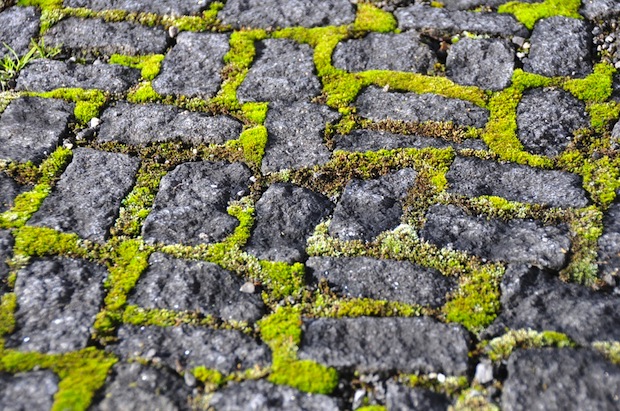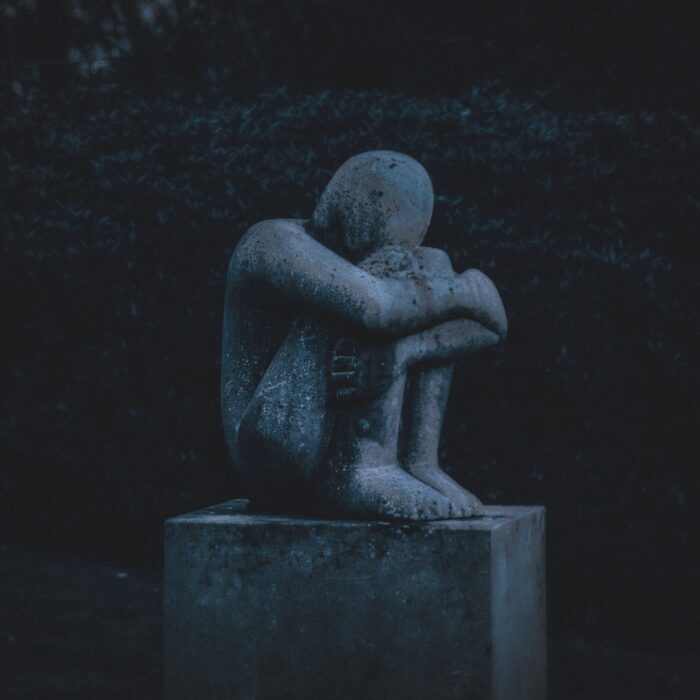You have no items in your cart. Want to get some nice things?
Go shopping The longer the house remained empty, the harder it was to see. It loomed, with the melancholy still of days when death is real. There was a smell under the fingers of the weeping willows there: something bad, something old. It was the centre of the town once, home to a merchant who had fitted the bogus coat-of-arms that peeked out with swallows’ eyes. And before that, a miniature castle shaped like a fist, still recorded in the dribbles of rounded stone plugged into the façade. There had been plans, in the middle decades of the century, to convert the house into a civic centre – a library or a courthouse, no one could agree. Even then the cost was unrealistic. It would take so much more time and energy to exorcise those greening walls than to start afresh. After the coal was stopped, it stood as a monument of shame, newly boarded-up windows on the High St. shuttering themselves from its view. People took diversions to avoid the pulverised ornamental garden, with its illegible sandstone arch. Stories circulated, of course, emanating from its walls like a wave of intelligence. Tales that might, mercifully, shift to other locations, develop universal themes. Only the children could bear to look for any length, too naïve to comprehend the pain and darkness in the stone, or rather naïve enough still to look and see at all.
The longer the house remained empty, the harder it was to see. It loomed, with the melancholy still of days when death is real. There was a smell under the fingers of the weeping willows there: something bad, something old. It was the centre of the town once, home to a merchant who had fitted the bogus coat-of-arms that peeked out with swallows’ eyes. And before that, a miniature castle shaped like a fist, still recorded in the dribbles of rounded stone plugged into the façade. There had been plans, in the middle decades of the century, to convert the house into a civic centre – a library or a courthouse, no one could agree. Even then the cost was unrealistic. It would take so much more time and energy to exorcise those greening walls than to start afresh. After the coal was stopped, it stood as a monument of shame, newly boarded-up windows on the High St. shuttering themselves from its view. People took diversions to avoid the pulverised ornamental garden, with its illegible sandstone arch. Stories circulated, of course, emanating from its walls like a wave of intelligence. Tales that might, mercifully, shift to other locations, develop universal themes. Only the children could bear to look for any length, too naïve to comprehend the pain and darkness in the stone, or rather naïve enough still to look and see at all.
Frayed threads of cotton hung at the sleeves of Janine’s t-shirt, worn thin like parchment or skin, a crumbling plastic slogan over her breasts that read: ‘GIRL’. She floated at the centre of a small group of children, her hand resting on one of the little boys’ hair. They stared silently from underneath the sandstone arch, drips of water falling onto sodden ground. They had been brought here from the rusting swings and charity-shop windows on what could have been an annual pilgrimage, the days shortening, the stories they had heard suddenly bristling on their lips in the Halloween fog. Like all such things, the words and the shapes of narrative had a foreign effect. Janine had waited till last, listening patiently to the stories told by the younger children. She leant against a silver birch, electronic cigarette tucked behind her ear. Finally, their faces turned to rest upon her.
‘There’s something else though,’ she began, eyes low. ‘I don’t know if I should talk about it. No one does … because it’s true.’
The smaller children were anxious, already unnerved by the exotic flavours of fate and murder, melodic highlights to a cultural drone that whispered of poverty. ‘Tell us,’ urged a young girl through sealed lips, forcing the words in case her nerve should fail.
Janine paused, an electric void dropping into her face. ‘It was before the mine shut. Everyone was at home getting drunk. Eating seconds of the big turkey dinners.’
‘Christmas?’ asked one of the smaller boys, Eoin.
‘On Christmas day.’
‘Was there snow?’
‘No … not that year. Just clouds and sleet. And voices in the evening, like singing.’
Eoin was shivering. Janine rooted around in a pocket and found a fragment of tray bake, which she passed to him. He snapped it up, eyes vacant and intense, a dirty cap clinging to his hair.
‘Suddenly there was this noise from the big house. A scream. See, at that time the manager lived there.’
Peggy, the next in age, moved to speak, with contradiction in her eyes. ‘That can’t be right, it was …’
‘Before,’ said Janine.
Peggy backed down, chastened.
‘So a few of the women went to see. My gran, or great-gran, was one of them. She remembered the sherry. When they got to the archway, the house looked deserted, no lights on or anything. So she crept through the garden, up to the window and looked inside.’
The afternoon was giving way.
‘And what?’
Margaret’s feet were swollen with the season. She pulled her coat more tightly around her shoulders and nodded to the Halliday sisters. ‘Slippy,’ she swore under her breath, moving delicately on the glassy stone. The shaft of her weapon was sleek in the night, a wooden handle unplugged from a broom or a rake. The shrouded bodies of the other women moved in winter patterns towards the source of the scream, now minutes old and seeping into the damp cracks of the town. Margaret knew them all, recognised the rhythmic press of their footsteps and the peculiar scents of their Christmas treats. She strode, hic, tottered down the hill to the sandstone arch that guarded the entrance. Conversation held a murmuring tempo among the gathered sets of eyes, waiting here at the focus of the town, Margaret to be the first and bravest. She ducked through the ivy hanging from the arch, pressed silently through the moistened grass and with acute, bloodshot eyes glared in.
There were faces in the darkness, hints of nose and ear and a crazy dancing. Bound within silence, an awful jittering echoed in the trees that spun against the wind. Margaret stared inside the frame hypnotized, on her tiptoes, thinking she could make out friends with dead hands among the frenzied shadow. It grew quicker, dust choking down from the cornicing, a patter of distant footsteps like mice, she holding her own legs from starting into a jig, hands wanting to clap, before roaring out suddenly, ‘Heeee-ooch!’
An inhale of breath. The ice on the windowpane froze over, the light grew deeper and the movement stopped. Margaret turned to find herself alone, with a presence reaching towards her from inside the house – she began to run, tripping over her skirts through the rose bushes and out onto the street. She daren’t look back, a rush of the wind whispering curses around the bristles of her ear, her vision clouded and red, never breathing until she was up round Back St. and safely inside the house, where she slammed the door.
‘Go and see for yourself,’ said Janine to no one in particular, opens palms assuring them that the evidence remained. None of the children were keen, but their shoulders drifted around and in a spoken enchantment they reached the edge of the overgrowth.
‘Is there anything in there?’ asked Peggy. ‘You know, furniture and stuff?’
All eyes moved to Janine. ‘Not anymore.’
‘What did they do with it?’
‘I’m not sure.’
‘Bet it was worth a fortune.’
Janine’s parents, like most of the people in the town, moved between half-skilled jobs, without a legacy. This was rural country, but few people could farm; they had come here for the coal. Huge sycamore and elms stood blasted on the edges of exposed moorland around the village.
Peggy slipped her hands into her pockets and stared at the front of the house. ‘It’s strange. It’s the same stone as everything else.’
‘Have you ever been inside, Janine?’ asked Eoin, eyes flaring a muddy blue.
‘Once.’
Janine wasn’t allowed out this late. The savage cold was exciting. There was a wet trim to the flagstones and tingling, sludgy remnants of tablet stuck to her teeth. Her parents were still out; there’d been a big meeting at the village hall. Janine had gotten tired of lingering around the house, kicking stones at the gutter, inspecting the lacing and shadows of colour on decaying leaves.
‘Hello!’ she shouted down North St., suddenly anxious passing the rounded belly of the kirk. There was nothing. She scuttled on, noticing the moisture in the air solidifying into ground fog.
And then something in the torch-lit distance; a buzzing that grew more distinct with each step, clarifying itself into a messy chorus. Janine stepped onto cobbles, remembering for some reason the smell of her mother’s hands, coated with soil. Her eyes widening, she moved down towards the big house, slipped unseen into a corner and listened to the noise. Some of them were cheering sounds of encouragement, others just chatting. The rhythms of their speech had a melodic effect. Some of the women might have been singing, but Janine had never heard music outside the house.
As Janine watched, transfixed, two of the Urquhart men came out of the door carrying a long mahogany dining table. Others followed lumbering pieces of dusty antique furniture: dressers, sideboards and single beds. They headed up the town with these trophies or memorials, Janine ducking behind sets of knees to avoid her father’s gaze. His hands were white around the legs of a carved press.
Janine didn’t feel the need to know what was happening, too absorbed in the canon of voices rolling through the air and blending with the fog.
‘Nae patience, those boys,’ said an old woman near to Janine’s head, her speech emerging from the mass. ‘Can this not wait till morning?’
‘Best to get it out, Eileen,’ replied another.
Janine moved inside the garden using the shadows as cover, her heart beating faster. Surprised to be inside the perimeter wall unchanged, she grew bolder and touched the icy grass.
The men came and went for what must have been an hour, Janine watching their faces. Some were joyful, others looked concerned or just tired. Finally it was done and the house stood empty, its oak door taken off the hinges to be repaired or something else. Janine needed to get home, but the gaping inside was looking at her. She could not resist its magnetic pull.
An inhale of breath. She dived inside the entrance and stood still for a moment, eyes riveted shut, terrified at what she might see. There was a new effect to the sound in here. The screeching footsteps of her entrance and her stolen breaths reverberated, multiplying. She listened, allowing the echoes of the village voices to grow and persist, shapes of men and women articulated in these eddying noises. She was shaking, fear giving way to a deeper emotion, like grief. With her lids clenched shut, veiny patterns of red, white and black moved together across her eyes. And the sounds continued, not wordless but beyond words, with the power of chanting.
‘Touch it, I dare you.’
Eoin looked round, shaking his head. ‘No way.’
‘What do you think’s going to happen?’ teased Peggy.
‘You do it then.’
The children were drawn up in a semi-circle, only feet from the doorway now, lured by a nervous gravity. There was a smell of dank, fertile earth and collapsing trainers. The index finger of Peggy’s right hand, bound in a fingerless glove, reached out and pressed the decrepit surface of the temporary door. It swung easily in, the arc of children’s feet taking an instinctive step backwards, a few of them wanting to break out but held by the team. Their eyes fixed on the opening, expecting the darkness to revolve into clarity, denied by the contrast between inside and out.
‘Go,’ someone said.
Eoin’s calf muscles fought his knees through a doorway and another and another. Small daggers of light from between boards on the windows crept into the rooms, illuminating spiders’ webs and swirling dust.
‘Where is everyone?’
Peggy lifted a lip to sneer at the smell of untouched wood and stone, skirting round the edges of large empty chambers. She was laughing, though not unafraid. It wasn’t as dark as she had imagined. You just had to dream what you couldn’t see.
‘I’ve found something!’
Janine was in what could have been the servant’s quarters. Her breath was visible as a thin mist, moving at one with the dust her feet were knocking up. She was darting in and out of spaces, starting to build into a panic, the responsibility of leadership turning sour. Her footsteps on the boards sounded like the workings of a metronome or pickaxe.
‘Come back.’
The whole building was groaning, unforgiven by the elements, an old ship facing nothing but the night. And inside, the voices of the children rang out in interweaving unity, each lost in their own section of the house, whimpers and songs of joy melding into one long note.
Standing now at the top landing, Janine could see the dim outlines of a row of paintings down the staircase, left behind for some reason. The faces in the portraits looked like slag heaps or ash. In this hollow shell, everything was in disrepair, a thick layer of sediment covering the black fingerprints that lined the walls and floor.
Still the house remained, full of breath and sound. The children followed rotten pathways through it that didn’t seem to end. This was surely a trap, though nothing was clear in the darkness. Stories of the house vibrated in the air with their voices, building perhaps to a crescendo, or only chanting on against history.
And outside, in the rows of homes fanning out along the hills, lights flickered on and curtains snapped across. The view was fading with the evening, lost to itself, misshapen trees keeping their faces hidden. Down the hill, the empty windows stared back, expressionless eyes of the house in the centre of town that no one spoke about. It was raining, clouds lingering above this flagship point of decay in a town slowly dying, as if a vengeful influence radiated outward, nature or something worse exacting a wordless price.

About Gerard McKeever
Gerard McKeever is a writer and academic based in Dumfries and Galloway, Scotland. Recent short stories by Gerard appear in, 'Glasgow Review of Books', 'The Flexible Persona', 'Litro', 'The Island Review', 'Bunbury', 'Storgy', 'From Glasgow to Saturn' and the Broken20 'Li' series. He holds a British Academy Postdoctoral Fellowship at the University of Glasgow.
- Web |
- More Posts(2)




